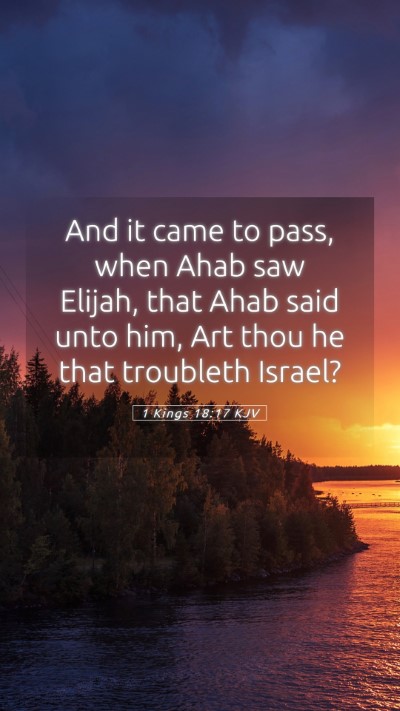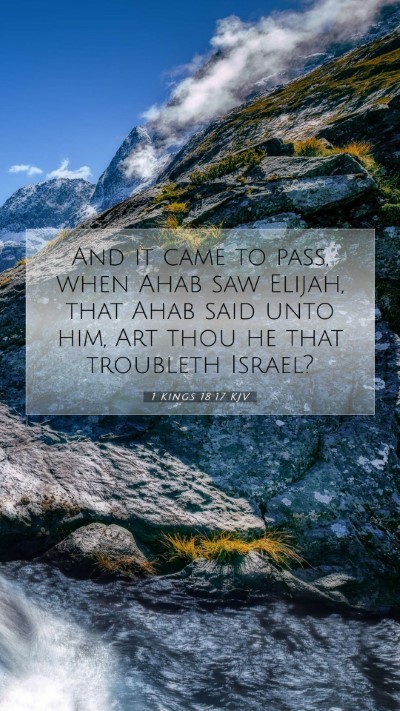Understanding 1 Kings 18:17: A Bible Verse Exegesis
In the context of the Old Testament, 1 Kings 18:17 is a pivotal verse that captures the charged moment between the prophet Elijah and King Ahab. This passage reads:
"And it came to pass, when Ahab saw Elijah, that Ahab said unto him, Art thou he that troubleth Israel?"
This inquiry from Ahab reflects the tension and the prophetic authority of Elijah, which resonates throughout biblical narratives.
Historical Context and Significance
Understanding the historical context is crucial for grasping the full implications of 1 Kings 18:17. King Ahab, who ruled over Israel during a time of great apostasy, had led the people into idolatry, primarily through the worship of Baal. Elijah, as a prophet of Yahweh, stood in stark opposition to Ahab’s policies and practices. This confrontation was not just a personal disagreement; it symbolized the broader spiritual conflict within Israel.
Commentary Insights
Matthew Henry Commentary
According to Matthew Henry, this passage illustrates the stark contrast between the sinful leadership of Ahab and the righteousness embodied by Elijah. Ahab's accusation reflects his own guilt and the turmoil caused by his idolatrous reign. Henry notes that Elijah’s presence was a reminder of God's ongoing covenant and the call to repentance for Israel.
Albert Barnes Commentary
Albert Barnes elaborates on Ahab's response, emphasizing that he perceived Elijah as the source of Israel's troubles due to the drought and famine resulting from the people's disobedience. Barnes suggests that Ahab's reaction points to a deeper spiritual blindness, as he did not recognize that it was his own sins that had led to this dire situation.
Adam Clarke Commentary
Adam Clarke offers functional analysis by suggesting that Ahab considered Elijah a "troublemaker" because the prophet vocalized God’s judgment, which included the drought. Clarke points out that the king’s deflection of blame onto Elijah serves as a narrative device to highlight the obstinacy and rejection of prophetic voices during periods of rebellion against God.
Theological Implications
The confrontation between Elijah and Ahab also carries significant theological overtones. It raises questions about the nature of authority, the responsibilities of leaders, and the consequences of deviating from divine law. The cry of Ahab signifies an uncomfortable truth: that the presence of God’s messenger intensifies the awareness of guilt among those living in rebellion against Him.
Application in Daily Life
For contemporary believers, this verse invites reflection on our spiritual integrity and the leaders we choose to follow. Are we, like Ahab, inclined to deflect blame onto others instead of examining our hearts? Elijah’s unwavering stand for God's truth encourages us to maintain our faith even in cultures that may oppose our beliefs.
Cross References
- 1 Kings 17:1 - The proclamation of drought as a judgment against Ahab's reign.
- Romans 1:18 - The revelation of God’s wrath against ungodliness.
- James 5:17-18 - Elijah’s prayers and their impact on the climate in Israel.
Conclusion
In summary, 1 Kings 18:17 presents a critical interaction that not only sets the stage for the showdown at Mount Carmel but also invites believers to examine their relationship with authority and obedience to God. Through the insights of biblical scholars and historical context, we gain a deeper understanding of this verse, which resonates with themes of accountability and repentance essential for spiritual growth.
Further Study Resources
For those engaging in personal or group study, consider utilizing various:
- Bible study tools to facilitate deeper understanding.
- Online Bible study courses that provide structured learning.
- Bible study guides that address Old Testament teachings.
Key Takeaways
- Elijah's role as a prophet is crucial for understanding God’s voice in difficult times.
- Ahab's blame-shifting illustrates a common human response to sin.
- This passage encourages self-reflection and the need for repentance among leaders and the led.


